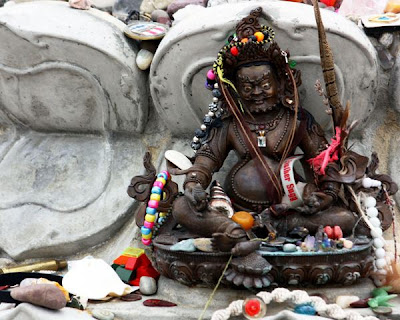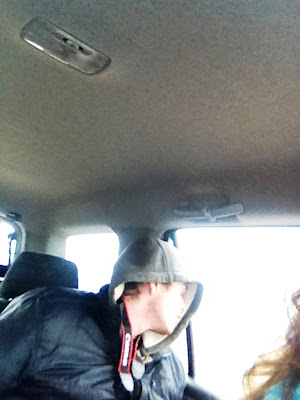Off the main highway you drive a few miles to what seems like the middle of nowhere and as promised, there it is.
A very large center statue surrounded by other statues, land and the mountains.
Along this road there are other houses including one across the street that has a cross in the window facing the garden. I wonder if that is intentional? I was also chased by a couple of stray dogs; dogs that aren't welcome at the garden. This is considered a holy place and they ask that if you bring your dog, that you leave it in the car.
Something that the lady behind this tree with the "Please No Dogs" sign either didn't read or decided didn't apply to her because you can see her little black dog galavanting around the grounds in the background.
It was quite cold in Arlee when I visited the garden, much colder than I expected and colder than it was at my house when I left. I am only wearing a sweater over a short sleeve shirt and my gloves managed to get left at home. Still, I want to see this more closely and to possibly verify the existence of exactly 1000 Buddhas so I get out and walk up.
As you walk towards the only entrance to the circular shaped garden (set up with 8 spokes to represent the Dharma wheel) you find what almost looks like a fountain but there is no water. Trinkets have been left all over the steps.
There are a few miniature statues here, all draped in a vast variety of items.
Like this plastic Indian figure and a glue stick. There are pony tail holders, charms, bracelets, toys and even an ID card from a school complete with the student name and photo still intact. Did he leave it himself or does he have no idea what happened to his ID card?
Even this rusting wrench was left behind.
The variety of things left is so diverse I find myself wondering whether people leave them as offerings or prayers or if people leave things to be funny or disrespectful as with this statue of Ganesha wearing a cross.
Beyond this area you come to the first spoke and to the first rows of Buddha statues.
These near identical statues are handmade concrete and the brochure says they contain prayers, mandalas and "blessed substances". Ultimately, I didn't count the Buddhas. First, there were other people here and I didn't want to be disrespectful of their experience. Second, I am freezing. One of the spokes was not completely filled all the way to the end.
I assume these Buddha statues here at the Buddha Barn (my name, not theirs) are awaiting placement when the weather warms up. There are a few other outbuildings and a gift shop which I did not visit. During the summer months they offer guided tours of the garden, which really should be more garden-like at that time. There are planting areas in between the spokes on the wheel that you can walk all the way around. I will definitely return in the spring to see what it looks like here with the grass all green and the flowers in bloom.
All of the spokes lead to the central figure: Yum Chenmo. This name means the "Great Mother". The brochure says, "Her image is the embodiment of the Buddha's teachings which elucidate that it is through the love and compassion for all sentient beings in unity with the enlightened wisdom realizing our inter-connectedness with all phenomena, that we may be awakened to our innate true nature." The throne is said to be filled with prayers, sacred texts and once again "substances" from "around the world".
I am impressed by this statue for its purely artistic beauty and the sheer scale of the installation. Especially considering it is placed in the middle of nowhere Montana.
In addition to the smaller Buddha statues, there are 3 larger statues. I don't know if they count towards the 1000 or if they are in addition to that. These represent the "Buddhas of the 3 times". I am not sure which one this is because it is cloudy and I don't know my North/South/East/West without the sun or being back in Texas where I lived my whole life until now and just knew.
In the very back there is a small pond which is currently frozen and 3 more statues.
Quan Yin, the Bodhisattva of infinite compassion.
Kyabje Dilgo Khyentse Rinpoche, one of the 14th Dali Lama's teachers. This statue and the next one are both carved in granite.
Tulku Orgyen Chemchok
When I mentioned that I visited the Garden to a few people who live here they said, "You went where? I didn't know there was such a place." I imagine people who don't live here have an even harder time believing it. Montana conjures images of hunters and militia not Buddhists. I am finding that the Missoula area at least is a little more diverse than an outsider would expect. Missoula is a college town so maybe that explains part of it.
Some asked why I would even bother to visit this Garden. "Are you a Buddhist?" Usually asked with wide eyes or one eyebrow lifted.
First I would say that if you have read any of the other posts here you will know that I enjoy the unusual attraction: The Beer Can House in Houston, the house shaped like a shoe in Pennsylvania, The John Dillinger Museum in Indiana. The Missoula Museum of Art might be nice, I don't know, I haven't been there yet. But, I expect that it isn't all that different than the Dallas Museum of Art (other than in size) or the Omaha Museum of Art or the Podunk Museum of Art.
Second, I don't need to be a Buddhist to appreciate the beauty of a garden or a work of art. No more than I need to be Christian to be awed by the architecture of a church or the workmanship of a fantastic stained glass window. I have always been interested in all kinds of religious symbolism, traditions and stories. I am not Catholic but I have a statue of Joan of Arc and her saint card in my china hutch. I also have an angel right outside the front door, 4 small Buddha statues on the top of the mirror in my bathroom, Hindu Mala beads, and the Hindu symbol Adi Shakti tattooed on my wrist.
The commitment of any person or persons to something meant to be beautiful and inspirational and to bring peace and love to others is admirable to me, regardless of the vehicle they use to do it. And I have to believe the people who dreamed of this Garden and then made it a reality are some very committed individuals. Otherwise, this tiny town in Montana would have a lot fewer Buddhas in their midst.






















































